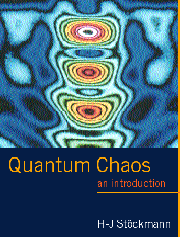4 - Floquet and tight-binding systems
Published online by Cambridge University Press: 19 October 2009
Summary
In their studies of the kicked rotator Casati et al. [Cas79] discovered that the quantization of classically chaotic systems can lead to the suppression of chaos. This is one of the most spectacular results in quantum chaos research. The classical dynamics of the kicked rotator is described by the famous standard map, and it has been known for some time that for sufficiently large kick strengths the classical system shows diffusive behaviour. But for its quantum mechanical counterpart the diffusion is stopped after some time by a process called dynamical localization. The dynamical localization of electrons has also been observed experimentally in the microwave ionization of highly excited hydrogen atoms [Gal88, Bay89]. For atoms the effect has also been demonstrated recently [Moo94].
All the examples mentioned belong to the Floquet systems, i.e. periodic time dependences are involved. Soon after the discovery of dynamical localization Fishman et al. [Fis82] found that there is a close relation between Floquet systems and the Anderson model, which has been used for a long time to study the influence of disorder on electronic wave functions in crystalline lattices. From this equivalence it became clear that dynamical localization is just a special case of the well-known Anderson localization.
For this reason Floquet systems and the Anderson model are discussed here together. For the Anderson model, however, only those aspects will be considered which are of relevance for dynamical localization.
Information
- Type
- Chapter
- Information
- Quantum ChaosAn Introduction, pp. 135 - 182Publisher: Cambridge University PressPrint publication year: 1999
Accessibility standard: Unknown
Why this information is here
This section outlines the accessibility features of this content - including support for screen readers, full keyboard navigation and high-contrast display options. This may not be relevant for you.Accessibility Information
- 1
- Cited by
